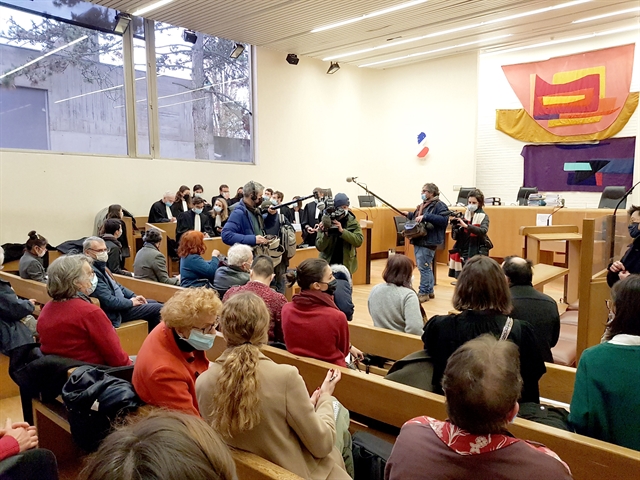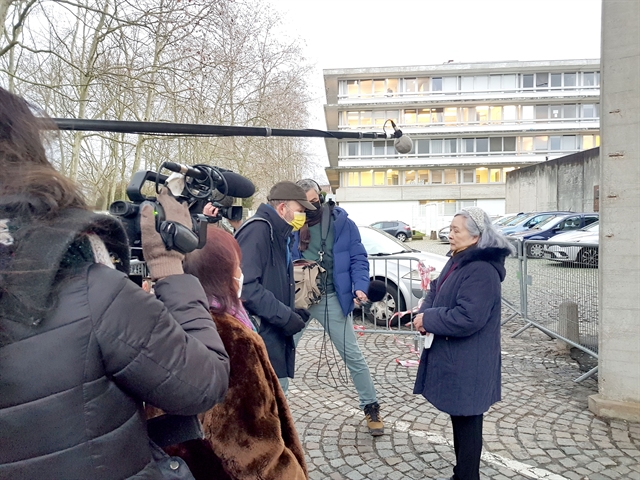 Society
Society

A hearing began on Monday of a case brought by Vietnamese-French woman Trần Tố Nga against the US companies that provided chemical toxins used by the US Army in the war with Việt Nam.

|
| The hearing was held on Monday. — VNA/VNS Photo |
PARIS — A hearing began on Monday of a case brought by Vietnamese-French woman Trần Tố Nga against the US companies that provided chemical toxins used by the US Army in the war with Việt Nam.
Held in Evry Crown Court in the suburbs of Paris, lawyers for the defendants spent more than four hours arguing the case for 14 chemical producers from the US. Nga’s three lawyers spoke for just 90 minutes during the opening.
In 2009, she testified for Agent Orange (AO)/dioxin victims at Việt Nam at the International People’s Tribunal of Conscience, in Paris. In 2013, the Crown Court of Evry accepted her lawsuit and one year later she received notice of the first procedural hearing.
The public in France has described the case as “historic”, through which Nga and the organisations supporting the lawsuit hope to promote international recognition of the “crime of environmental destruction”.
Secretary-General of the France - Vietnam Friendship Association Jean-Pierre Archambault considers the January 25 hearing an important stride forward in the lawsuit Nga has pursued for more than six years to seek justice for Vietnamese AO/dioxin victims.
He categorised the arguments presented by the lawyers defending the US multinational companies as disgusting, noting they believe their actions followed US Government orders and, hence, they do not bear any responsibility for producing the dangerous herbicides that are still tormenting millions of victims in Việt Nam even though the war ended decades ago. He also pledged support to the struggle for Nga.
Marie Toussaint, a Greens European Free Alliance Party member in the European Parliament, expressed her discontent over the defendants’ lawyers providing incorrect arguments that Nga no longer has AO/dioxin in her blood.
The US companies tried everything possible to cast off their responsibility in AO production, Toussaint said, adding it is a historical fact that in war, atomic weapons destroyed not only land and people at the time but also severely impacted the following generations, and the same thing has happened with chemical toxins like AO/dioxin.
Nga said that although the court is scheduled to issue a verdict in May, her struggle will continue.
“We will remain patient and persistent, as we have been for the last six years or more,” she said.
Nga, born in 1942, filed the lawsuit in May 2014. With the support of several non-governmental organisations, she accused the companies of causing lasting harm to the health of herself, her children, and countless others, and of destroying the environment.
She graduated from a Hà Nội university in 1966 and became a war correspondent of the former Liberation News Agency, part of the Vietnam News Agency. She worked in some of the most heavily AO/dioxin affected areas in southern Việt Nam, such as Củ Chi, Bến Cát, and along the Hồ Chí Minh Trail, ultimately experiencing contamination herself.
Of her three children, the first died of heart defects and the second suffers from a blood disease. She has also contracted a number of acute diseases
On April 16, 2015, the Evry Crown Court held the first hearing on the case. The trial was scheduled to begin in October 2020 but was postponed due to COVID-19.
Media highlight
The hearing has grabbed the attention of local media, which has called it “historic”.
The headline on the front page of L'Humanité read: “A story of an American war crime tried 55 years later in France”, reflecting on the lives of Nga and millions of other victims of AO/Dioxin and her enduring fight for justice over the last six years. The article said the historic trial against 14 American companies is now entering a new phase at the Crown Court of Evry.

|
| Trần Tố Nga talks to the press. — VNA/VNS Photo |
The lawsuit has been called a David-and-Goliath fight, as dozens of lawyers for the multinationals have deployed all possible strategies to slow down the progress of the trial, it said, adding that a few years ago the turnover of Dow Chemical alone exceeded Việt Nam’s GDP.
It also said the challenge is to have a French court recognise the association between human exposure to the ultra-toxic pesticides used by the US in the Vietnam War and the health problems experienced by Vietnamese victims. If confirmed, millions of AO/Dioxin victims could demand compensation.
Le Monde, meanwhile, emphasised that Nga knew she would have to handle a prolonged legal battle and there would be appeals and all kinds of examinations to establish whether there is a link between her health conditions and the US use of herbicides in her homeland. It said there is no other lawsuit against these agro-chemical firms who were aware of the toxicity of their products sold to US armed forces.
Supported by many associations, Nga hopes that the trial will set a precedent and foster international recognition of the crime of ecocide, Nouvel Observateur said in its article headlined “Agent Orange: Trần Tố Nga’s historic trial against the agrochemical industry”. In France, it could help victims of chlordecone in the West Indies and even glyphosate, it noted.
If Nga wins, the case would indeed recognise the responsibility of these major firms in harming human life and the environment, the newspaper added.
Liberation, meanwhile, quoted Dow Chemical’s own words as saying Agent Orange is extremely powerful with an “exceptional toxicity”. The defoliant was at the heart of the largest chemical warfare programme in the 20th century, conducted by the US not only in Việt Nam but also in neighbouring Laos and Cambodia. Its lasting effects are still being felt today.
The effects of AO/Dioxin are seen even in the fourth generation, Reporterre said in its story, and at least 100,000 children are suffering from serious congenital anomalies. This civil trial is not only an individual fight but could also have a significant influence on all victims.
It added that whatever the outcome of the trial, there will be an appeal from the chemical giants who cannot afford to lose, or from Nga who has nothing more to lose, it added.
The 14 companies defending the action brought by Nga include Dow Chemical, Monsanto, Harcros Chemical, Uniroyal Chemical and Thompson Hayward Chemical. — VNS




